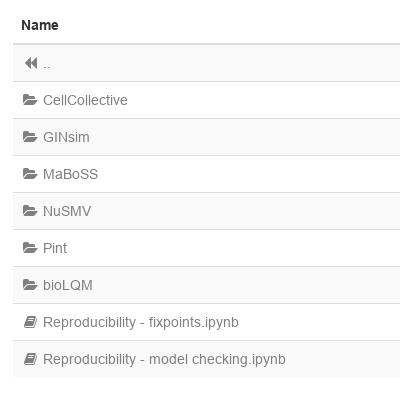The CoLoMoTo Interactive Notebook relies on Docker and Jupyter technologies to provide a unified environment to edit, execute, share, and reproduce analyses of qualitative models of biological networks.
Quick usage guide
Without any installation
Visit mybinder.org/v2/gh/colomoto/colomoto-docker/mybinder/latest to launch the most recent CoLoMoTo Notebook environment without any installation thanks to Binder services. You can replace latest with a specific image tag.
Note that the computing resources are limited and the storage is not persistent.
With Python Helper Script
You need Docker and Python. We support GNU/Linux, macOS, and Windows.
sudo pip install -U colomoto-docker # only once; you may have to use pip3
colomoto-docker
The container can be stopped by pressing Ctrl+C keys.
By default, the script will fetch the most recent colomoto/colomoto-docker tag. A specific tag can be specified using the -V option; or use -V same to use the most recently fetched image. For example:
colomoto-docker # uses the most recently fetched image
colomoto-docker -V latest # fetches the latest published image
colomoto-docker -V 2018-05-29 # fetches a specific image
Warning: by default, the files within the Docker container are isolated from the running host computer, therefore files are deleted after stopping the container, except the files within the persistent directory.
To have access to the files of your current directory you can use the --bind option:
colomoto-docker --bind .
If you want to have the tutorial notebooks alongside your local files, you can do the following:
mkdir notebooks
colomoto-docker -v notebooks:local-notebooks
in the Jupyter browser, you will see a local-notebooks directory which is
bound to your notebooks directory.
See
colomoto-docker --help
for other options.
Having issues? have a look at our Troubleshooting page, or open an issue.
Python-less usage
You need Docker.
First, pick an image version among colomoto/colomoto-docker tags. Fetch the image with
docker pull colomoto/colomoto-docker:TAG
The image can be ran using
docker run -it --rm -p 8888:8888 colomoto/colomoto-docker:TAG
then, open your browser and go to http://localhost:8888 for the Jupyter notebook web interface
(note: when using Docker Toolbox, replace localhost with the result of
docker-machine ip default command).
Available software tools with Python API
- ActoNet – Abduction-based control of fixed points of Boolean networks
Python moduleactonet - AEON.py – Symbolic analysis (attractors, reachability) of (partially specified) Boolean networks
Python modulebiodivine_aeon - bioLQM – Logical Qualitative Modelling toolkit
Python modulebiolqm - BNS – Identification of synchronous attractors
Python modulebns - BooleanNet – Simulation of Boolean regulatory networks
Python moduleboolean2 - boolSim – Attractors and reachable sets in synchronous and asynchronous Boolean networks
Python moduleboolsim - CABEAN – A Software Tool for the Control of Asynchronous Boolean Networks
Python modulecabean - Caspo – Reasoning on the response of logical signaling networks with Answer Set Programming
Python modulecaspoandcaspo_control - CaSQ – Convert static interaction maps into executable models
Python modulecasq - CellCollective – Model repository and knowledge base
Python modulecellcollective - GINsim – Boolean and multi-valued network modelling
Python moduleginsim - MaBoSS – Markovian Boolean Stochastic Simulator
Python modulemaboss - mpbn – Most Permissive Boolean Networks
Python modulempbn - NORDic – Network Oriented Repurposing of Drugs
Python moduleNORDic - NuSMV – Symbolic model-checker
Python modulenusmv - Pint – Static analyzer for dynamics of Automata Networks
Python modulepypint - PyBoolNet – Generation, modification and analysis of Boolean networks
Python modulePyBoolNet - R-BoolNet – Analysis and reconstruction of Boolean networks dynamics
Generic RPY2 python interface - scBoolSeq – scRNA-Seq data binarisation and synthetic generation from Boolean dynamics
Python modulescboolseq - pyStableMotifs – Target-control of Boolean networks
Python modulepystablemotifs

